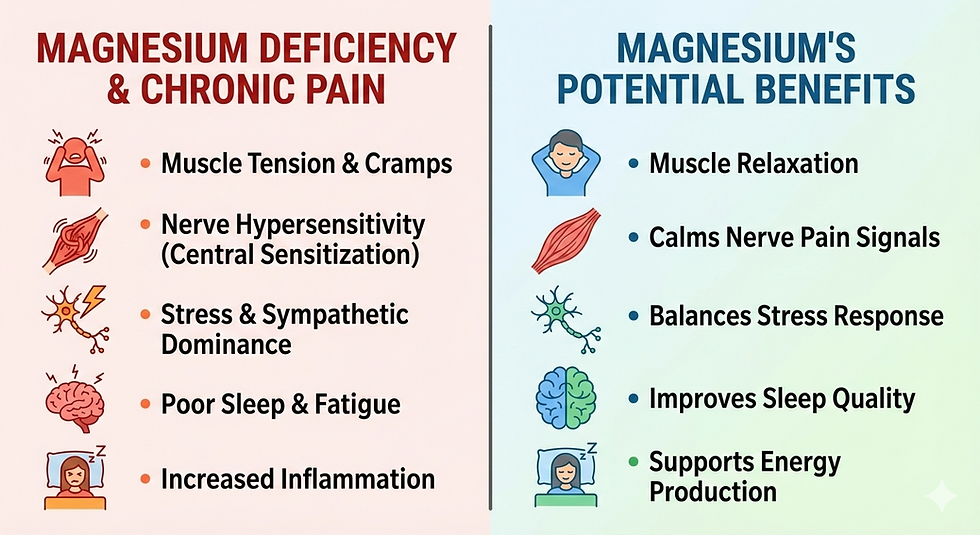Chronic Pain Genetics: How DNA mutations, that you may not even realize you have, affect your chronic pain
- Dr. Jason Winkelmann

- Nov 30, 2023
- 3 min read
Updated: Aug 6, 2025

DNA mutations are more common than we think. The most common type of mutation is a single nucleotide polymorphism (SNP) in which a single typo in the genetic code is made. Depending on where this typo is made you may not be affected by it or you may not even realize you have the mutation because it doesn't affect your day to day life in a noticeable way. These SNPs can affect how you experience pain and how various treatments affect you so it is important for your chronic pain specialist to assess you for them as there are ways to support these mutations so that they are less impactful! We will explore the four most common SNPs, also referred to as dirty genes, in their relationship to chronic pain.
The COMT Gene Mutation: Deciphering the Role of Catecholamines
Our genetic makeup holds clues to why chronic pain affects individuals differently. The COMT mutation, one of these genetic variations, plays a pivotal role. It interferes with the processing of catecholamines, such as dopamine, epinephrine, and norepinephrine. Norepinephrine, in particular, acts as a natural pain modulator by increasing inhibitory interneurons in the spinal cord, reducing the transmission of pain signals to the brain. Chronic pain sufferers have less inhibitory interneurons in their spinal cord so they process pain more intensely than the average person. Knowing that you have a COMT mutation allows your chronic pain specialist to tailor treatments towards supporting the production of norepinephrine in your body.
The MAOA Gene Mutation: Serotonin's Impact on Pain, Mood and Sleep
Another significant player in the realm of genetic variations is the MAOA mutation, impacting serotonin processing. Serotonin, known for its role in mood regulation, also plays a crucial part in chronic pain. In partnership with norepinephrine, serotonin creates more inhibitory interneurons in the spinal cord, which helps dampen pain signals reaching the brain. Additionally, serotonin is essential for melatonin production, a key factor in achieving restorative sleep, which can be difficult for the chronic pain sufferer! Recognizing the impact of the MAOA mutation opens avenues for targeted interventions that not only address pain but also improves mood and sleep quality!
The GST/GPX Gene Mutation: Navigating Toxins and Inflammation
Moving into the realm of detoxification, the GST/GPX mutation takes center stage. Environmental toxins that accumulate in the body, and cannot be eliminated, contribute to the production of chronic inflammation. Something that is at the root of all chronic pain conditions. This genetic variation affects the body's ability to eliminate toxins. The connection between environmental toxins, inflammation, and worsening chronic pain underscores the importance of addressing the GST/GPX mutation in comprehensive pain management. "Cleaning" your genes and supporting these mutations becomes a proactive approach to mitigating the impact of toxins on chronic pain. By doing so, not only does the inflammatory burden decrease, but the effectiveness of other pain treatments is also enhanced!
The NOS3 Gene Mutation: A Closer Look at Blood Vessel Formation and Function
Delving into vascular dynamics, the NOS3 mutation emerges as a key player in chronic pain. This genetic variation interferes with the formation of new blood vessels and impacts blood flow and tissue oxygenation. Reduced blood flow, means less oxygen is being delivered to healing tissues, which exacerbates pain and hinders the body's ability to heal tissues as oxygen is a main fuel source. Supporting your NOS3 mutation enhances blood vessel formation and ensures improved circulation and oxygenation to affected tissues. By incorporating interventions that support this genetic aspect, chronic pain sufferers can experience a more comprehensive and targeted approach to pain relief!
Decoding chronic pain involves unraveling the genetic intricacies that shape individual experiences. The COMT, MAOA, GST/GPX, and NOS3 mutations each contribute a unique perspective, highlighting the interconnected nature of genetics and pain. While we cannot yet change our genetic code to fix these typos, there is a lot that can be done on an individual basis to "clean up" these dirty genes and to support your body to allow for healing to resume!




Comments